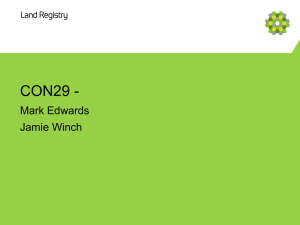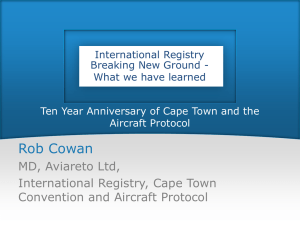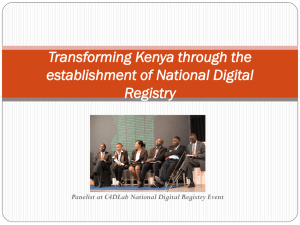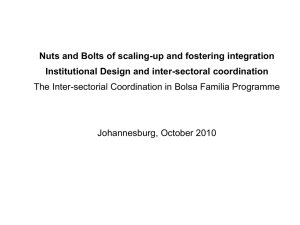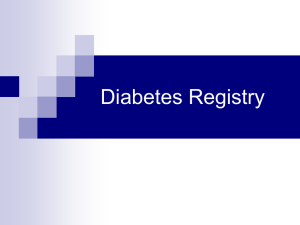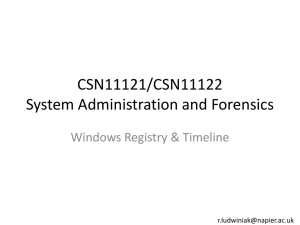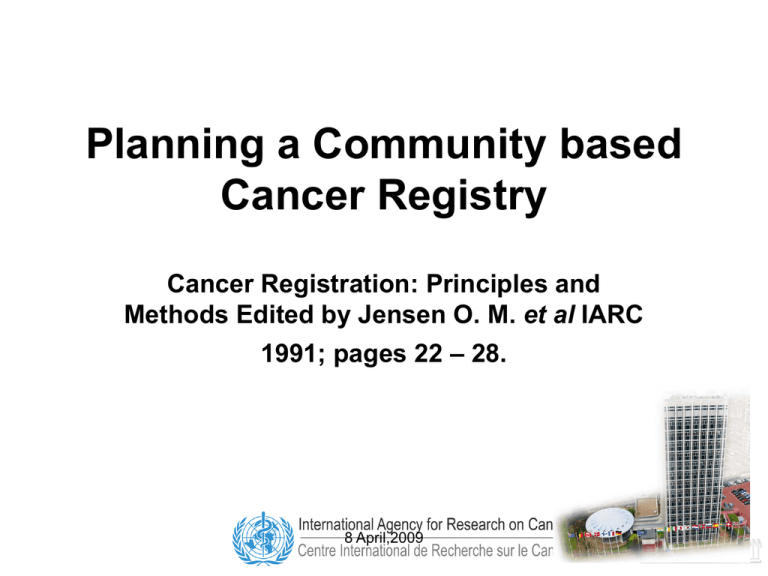
Planning a Community based
Cancer Registry
Cancer Registration: Principles and
Methods Edited by Jensen O. M. et al IARC
1991; pages 22 – 28.
8 April,2009
Planning a Community based
Cancer Registry
– The World Health Organization estimates that 7,6
million people died of Cancer in 2005 and 84 million
people will die in the next 10 years if action is not
taken.
– More than 70% of all Cancers Deaths occurs in Low
and Medium Income Countries , where resources
available for prevention, diagnosis and treatment of
cancer are limited or non existent.
Cancer Control: Knowledge In Action: WHO,2006
8 April,2009
PROJECTED CANCER CASES: 2000-2050
Developed
2050
2020
2000
Developing
0
50
100
8 April,2009
150
200
total deaths (millions)
Cancer Deaths
9.0
10
7.6
8
6
6.7
5.5
4
2
0
2.1
2.3
2005
2015
high income countries
low-middle income countries
WHO mortality database and projections
8 April,2009
Planning a Community based Cancer
Registry
Estimated ASR(W) Gobocan,2002
156.7
Eastern Africa
158.7
128.8
Less developed
Female
Male
158.7
228
More developed
314.1
0
50
100
150
200
ASR(W)
8 April,2009
250
300
350
GEOGRAPHICAL COVERAGE FOR- CI5IX
PERIOD -1998-2002
38 (710)
86/105
3 (310)
119/136
45 (3700)
48/83
28 (520)
10/29
51 (800)
4/16
10 (31)
16/18
8 April,2009
Number of countries (total population in millions, 2000)
Registries, populations in CI5 IX: accepted/submitted
CI5 Volume IX 1998-2002
World population covered is 11%
(704.5 million)
Cancer registries
% by
Continent
Population
Coverage
million (%)
(5/16)
31%
8.8 (1%)
(44/77)
57%
152.3 (4%)
(100/120)
83%
238.8 (33%)
North America
(54/58)
93%
258.5 (80%)
Oceania
(11/13)
85%
23.0 (73%)
South and Central
America
(11/29)
38%
23.0 (4%)
Africa
Asia
Europe
8 April,2009
Included
/submitted
Cancer Incidence in Africa from the population
based cancer registries
Ci5IX-1998-2002
8 April,2009
Cancer registry
• “The activity
of a Population Cancer Registry is
to collects information on all new cases cancer
in a reference population, usually that of a
defined geographical area.”
• “The minimal objectives are: incidence rates,
planning and evaluation of cancer control
program and survival.”
8 April,2009
Jensen& Storm, 1991
Cancer Registry
• Aims:
• To produce data on cancer INCIDENCE .
• Validate data on cancer MORTALITY.
• Time TRENDS
• Outcomes in Cancer SURVIVAL,
• Pathway to cancer RESEARCH .
• Instrument to support Cancer Control.
8 April,2009
Planning a Community based Cancer
Registry
• Definition of cancer registry
• Advisory committee
• Population denominators
• Legal aspects on confidentiality
• Size of population and number of cases
• Physical Location of the registry
• Finance
• Personnel
• Equipment and office space
8 April,2009
Planning a Community based
Cancer Registry
• Definition of cancer registry
• Cancer Registration is a process of continuing,
systematic collection of data on the occurrence and
characteristics of reportable malignant neoplasm with
the purpose of helping to asses and control the impact
of cancer in the community.
Jensen& Whelan, 1991
8 April,2009
Planning a Community based
Cancer Registry
•
Cancer Registry
• Cancer Registry is an office or institution which attempts
to collect, store, analyse and interpret data on persons
with diagnosis of cancer .(or tumours )
– Ex urinary tract papilomas, brain tumours.
Jensen& Whelan, 1991
8 April,2009
Planning a Community based
Cancer Registry
•
•
Population Based Cancer Registry
The population based cancer registry collect information
of all new cancer cases in defined population( most
frequently in a geographical area ) Jensen& Whelan, 1991
– Data on cancer incidence
has to be collected from all
sources of information in the coverage area in starting
from
8 April,2009
GEOGRAPHICAL COVERAGE
•
New York State Cancer Registry, United States
•
Registration area
•
The New York State Cancer Registry (NYSCR) contains reports on
all malignant tumors (except basal cell and squamous cell skin
cancers), most in situ lesions, and certain benign tumors. The
Registry, which is the second oldest state tumor registry in the
United States, has had mandated cancer reporting since 1940. At
the time of its founding, the registration area covered the entire
state except New York City. Beginning in 1973, the reporting
mandate was extended to include New York City. The Registry
is considered to be population-based since 1976.
CI5IX, Narratives www.dep.iarc
8 April,2009
Planning a Population Based Registry
• Advisory committee:
• It is board composed by cancer registry personnel, epidemiologist,
pathologist, oncologist, and representing from the source of
information and potential users of cancer registry data.
• They can be a link to establish cooperation and support with the
local medical community and health care professionals.
8 April,2009
Planning a Population Based Registry
• Population denominators
• The availability of accurate and regularly published
population data.
• Population figures by sex and five years age group.
Except for Childhood cancer.
• The population cancer registry must use de definitions of
populations groups, geographical areas as they are
presented by the official vital statistics.
8 April,2009
8 April,2009
Population Based Cancer Registry
Narrative and population
8 April,2009
Planning a Population Based Registry
• Legal aspects on confidentiality
• Reporting a cancer cases to a population based cancer
registry can be:
– Compulsory.
– By Legislation.
– Administrative order.
8 April,2009
Planning a Population Based Registry
• Size of a population and number of cases
• There is no ideal size for a population cancer
registry.
• most of the cancer registry operates with a
source of population from one to half a million
8 April,2009
Planning a Population Based Registry
• Size of a population and number of cases
• Large populations – difficult to maintain
completeness and data quality.
• Small populations – takes time to get meaningful
data.
• Intermediate population – linkage with vital
statistics
8 April,2009
Large populations
Korea
National cancer
Registry –
population 48
million
1999-2002-Number of cases
Male =241.155
Female=183.620
Small populations
Hiroshima
1,13milion
1996-2000-Number of cases
Male=14.450
Female=10.260
8 April,2009
Intermediate population
Size of the population 5.340.000 million
1998—2002
Number of cases
Male=61.586
Female=66.532
8 April,2009
Planning a Population Based Registry
• Size of a population and number of cases
• It depends of the size of the country it is
preferable to establish a intermediate cancer
registries to ensure completeness and data
quality
8 April,2009
Planning a Population Based Registry
• Physical Location of the registry
• The location of the cancer registry depends of
the local situation
–
–
–
–
–
–
Universities
Associated hospital
Cancer centre
Pathology labs
Health statistics
Ministry of Health
8 April,2009
Planning a Population Based Registry
• Physical Location of the registry
•
• The location is intimately linked to the administrative dependency of
the cancer registry.
• Has to be able to request demographic data and to obtain detailed
information from the medical sources in the region and to the
governmental health services either professional groups.
• The cancer registry should be autonomous as possible to interact
and collaborate nationally and internationally.
8 April,2009
Planning a Population Based Registry
• Finance
• Funds to maintain a cancer registry depends on:
•
•
•
•
•
The size of the cancer registry.
The number of data collected.
The number and size of the different sources of information.
If the registries do a regular follow up of the cases.
The costs of the cancer registration increases over the time.
– Increase the number of cases, sources of information, more space,
additional staff etc.
8 April,2009
Planning a Population Based Registry
• Personnel
• The leadership of the coordinator is a key for the
success.
• Technical Staff- Registrar.
–
–
–
–
Training in cancer registration.
Collect data, Code, Check consistency
Software to input data.
The number of staff depends on the size of the population
coverage.
– One staff to cover 1000 cases occurring annually in the
population.( Active data collection)
8 April,2009
Planning a Population Based Registry
• Personnel
• Qualifications:
• Technical training and experience
• Coordinator can be: Medically qualified with a background in
epidemiology, public heath or Oncology.
• Consultants to advise on pathology, clinical oncology, Epidemiology,
and Statistics.
• Technical staff:
• Registrars responsible for cases findings, abstracting, code with
specific training course.
• Data processors are needed depending on the size of the cancer
registry.
8 April,2009
Planning a Population Based Registry
• Personnel
• Qualifications:
• Technical training and experience
• Coordinator can be: Medically qualified with a background in
epidemiology, public heath or Oncology.
• Consultants to advise on pathology, clinical oncology, Epidemiology,
and Statistics.
• Technical staff:
• Registrars responsible for cases findings, abstracting, code with
specific training course.
• Data processors are needed depending on the size of the cancer
registry.
8 April,2009
Techniques of registration
Population
Surface area
Latitude
Year
Year
Cancer *
% cases treated
outside
registration
area
% non-residents
treated inside
registration
area
Africa
Algeria, Setif
1,365,488
6,504
35° N
1986
1986
A
60
20
Egypt, Gharbiah
3,665,524
1,943
31° N
1998
1999
A
8
10
494,800
2,669
NS
1987
1989
A
~5
8
Tunisia, Central Region
Case finding, abstracting and coding
Hospital in-patient records
Public hospital in-patient facilities
Private hospital/
clinic in-patient facilities
Private hospital/
clinic out-patient facilities
Radiotherapy
Pathology labs
Hematology labs
Autopsy
Death cert.
Screening programs
% cases abstracted by registry personnel
8 April,2009
Classification and coding
Full title
Site
C00
C01
Malignant neoplasm of lip
Base of tongue
C03
C04
C05
Malignant neoplasm of gum
Floor of mouth
Palate
Unspecified parts of mouth
C06
8 April,2009
Groupings
Short title
Lip, Tongue
Tongue
C01-C02
C03-C06
Mouth
Information recorded
Yes /Not
Basic
Date of birth
ID no
Incidence date
Ethnic group/
race/
colour
Stage of disease
Nature of 1st
treatment
Brain and
nervous
system
Follow-up for vital status:
all/selected/none
Death certificates used to
update vital status
Active follow-up of alive
cases
Recoded to behaviour /3
Ca of Bladder, in situ
Ca of bladder NOS
Benign tumours of brain and nervous system
Borderline tumour, unc and unk behaviour of ovary
Borderline tumour, unc and unk behaviour of
endometrium
Borderline tumour, unc and unk behaviour of brain
Ductal ca in situ of breast
Intraduct ca NOS of breast
Lobular ca in situ of breast
8 April,2009
Planning a Population Based Registry
• Equipment and office space
• It depends of the size and activities of the cancer
•
registry.
Storage - secure space for case documents especially if
the cancer registry is manually operating.
• If the
cancer registry is connected to a sever it is
necessary to do standards procedures to ensure data
confidentiality.
8 April,2009
8 April,2009
Collaborations
Organizations of registries
• International Association of Cancer
Registries (IACR)
• European Network of Cancer Registries
(ENCR)
(European Union - EU)
8 April,2009
Planning a Population Based Registry
• Conclusions
• To know the cancer incidence is should be
stressed in a cancer control program
• The cancer registry is must be a
continuous activity linked to cancer
control and cancer research.
8 April,2009

